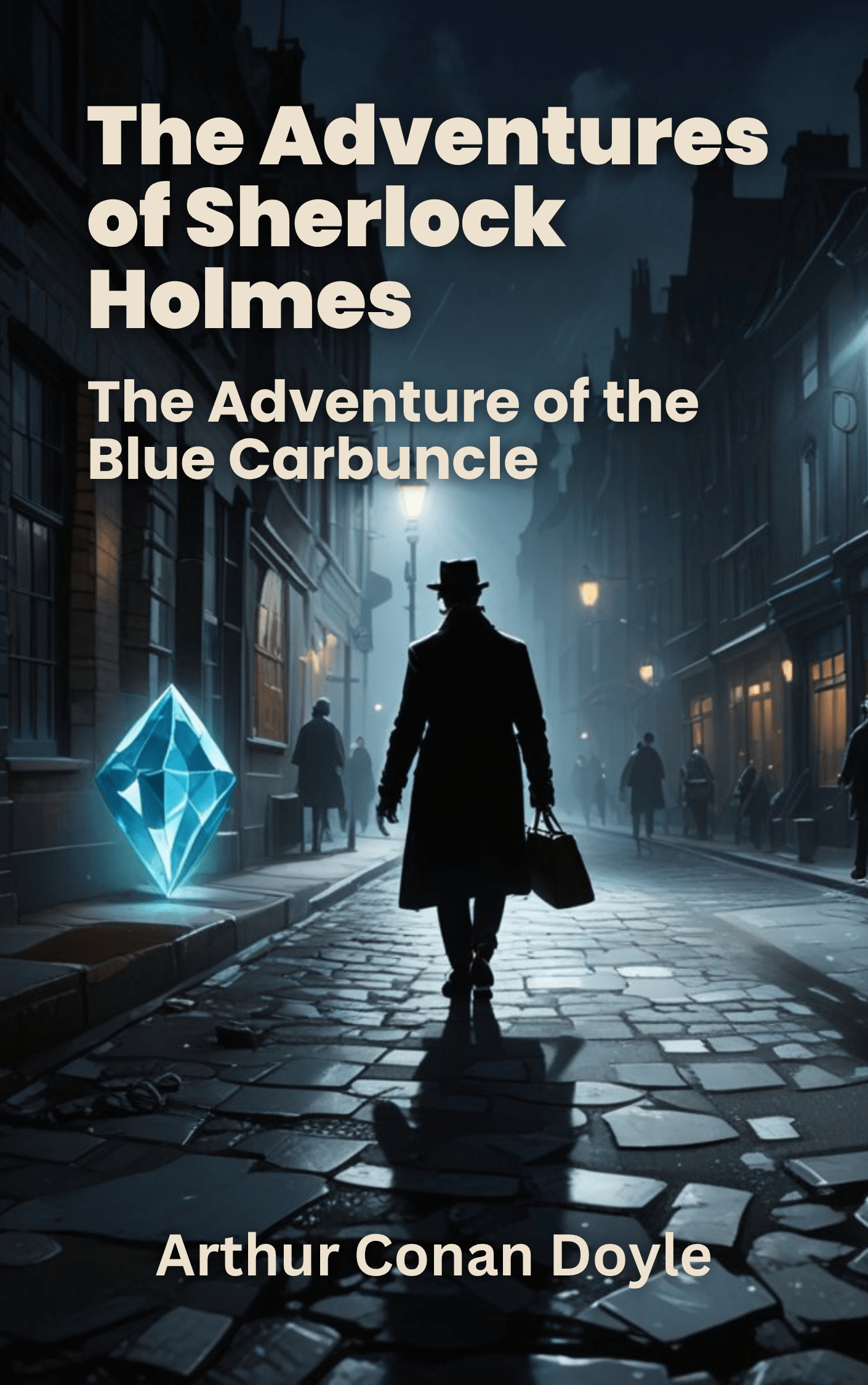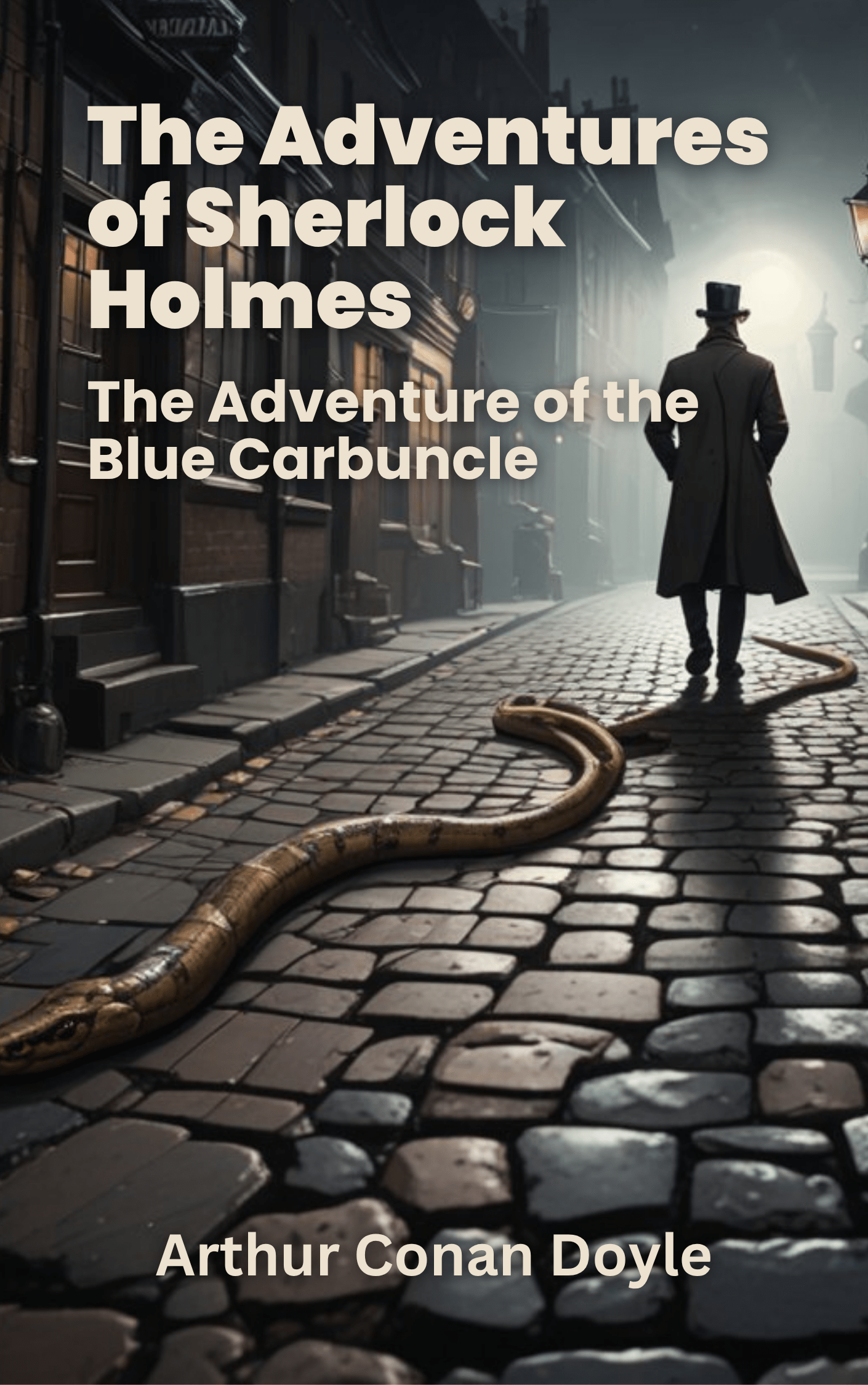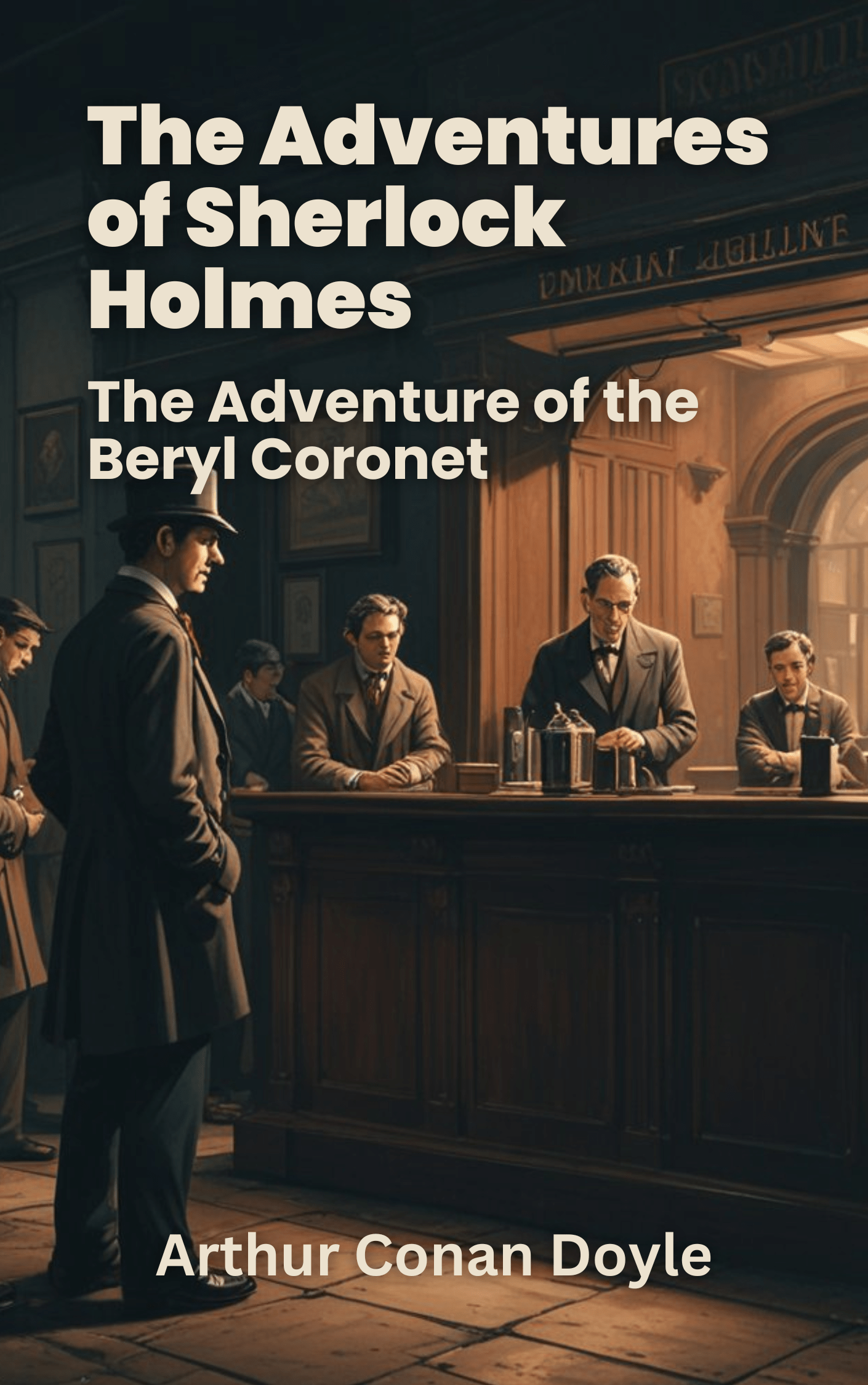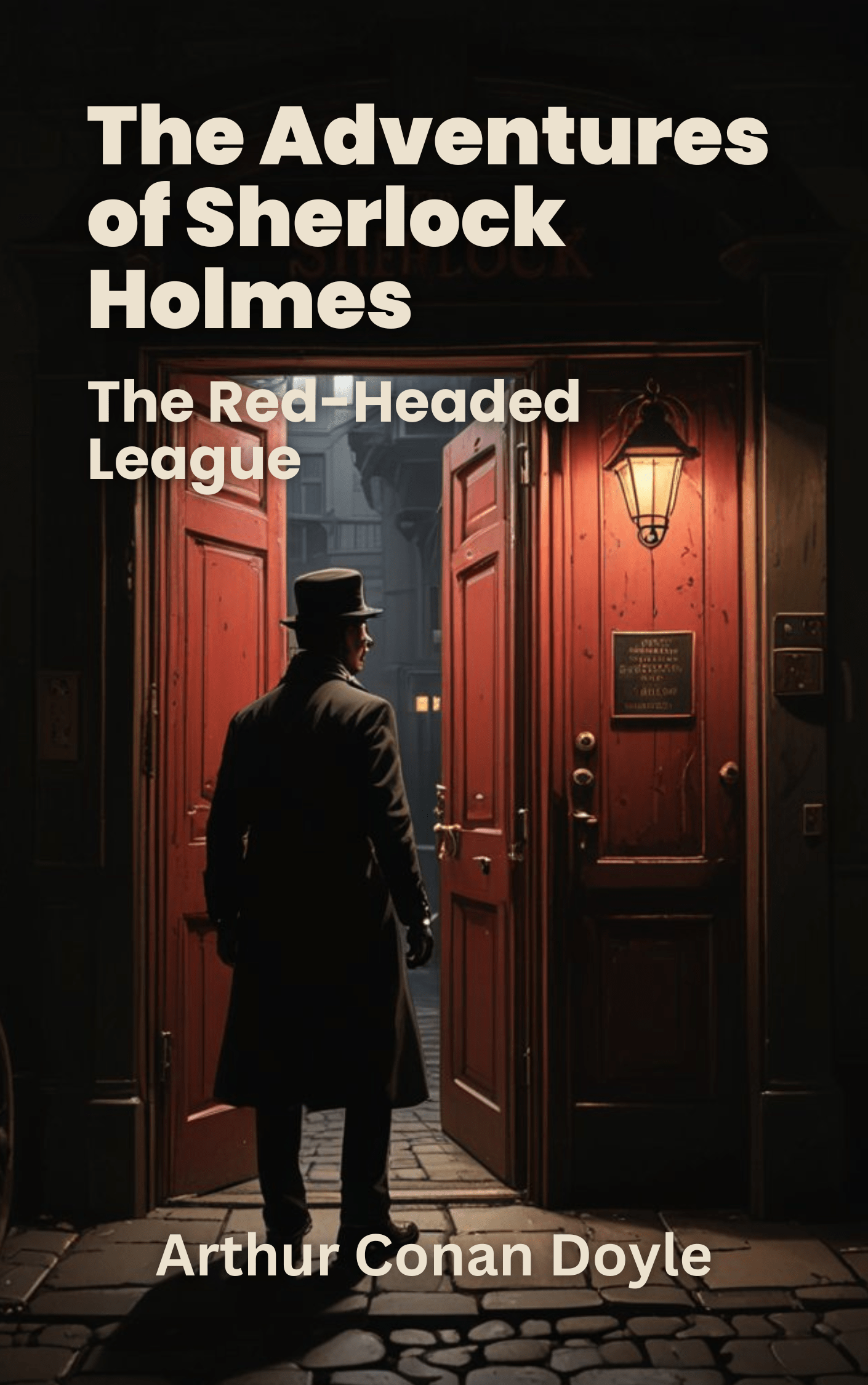Five Years Later
Tellson’s Bank by Temple Bar was an old-fashioned place, even in the year one thousand seven hundred and eighty. It was very small, very dark, very ugly, very incommodious. It was an old-fashioned place, moreover, in the moral attribute that the partners in the House were proud of its smallness, proud of its darkness, proud of its ugliness, proud of its incommodiousness. They were even boastful of its eminence in those particulars, and were fired by an express conviction that, if it were less objectionable, it would be less respectable. This was no passive belief, but an active weapon which they flashed at more convenient places of business. Tellson’s (they said) wanted no elbow-room, Tellson’s wanted no light, Tellson’s wanted no embellishment. Noakes and Co.’s might, or Snooks Brothers’ might; but Tellson’s, thank Heaven—!Any one of these partners would have disinherited his son on the question of rebuilding Tellson’s. In this respect the House was much on a par with the Country; which did very often disinherit its sons for suggesting improvements in laws and customs that had long been highly objectionable, but were only the more respectable.Thus it had come to pass, that Tellson’s was the triumphant perfection of inconvenience. After bursting open a door of idiotic obstinacy with a weak rattle in its throat, you fell into Tellson’s down two steps, and came to your senses in a miserable little shop, with two little counters, where the oldest of men made your cheque shake as if the wind rustled it, while they examined the signature by the dingiest of windows, which were always under a shower-bath of mud from Fleet-street, and which were made the dingier by their own iron bars proper, and the heavy shadow of Temple Bar. If your business necessitated your seeing “the House,” you were put into a species of Condemned Hold at the back, where you meditated on a misspent life, until the House came with its hands in its pockets, and you could hardly blink at it in the dismal twilight. Your money came out of, or went into, wormy old wooden drawers, particles of which flew up your nose and down your throat when they were opened and shut. Your bank-notes had a musty odour, as if they were fast decomposing into rags again. Your plate was stowed away among the neighbouring cesspools, and evil communications corrupted its good polish in...
A Sight
You know the Old Bailey well, no doubt?” said one of the oldest of clerks to Jerry the messenger.“Ye-es, sir,” returned Jerry, in something of a dogged manner. “I do know the Bailey.”“Just so. And you know Mr. Lorry.”“I know Mr. Lorry, sir, much better than I know the Bailey. Much better,” said Jerry, not unlike a reluctant witness at the establishment in question, “than I, as a honest tradesman, wish to know the Bailey.”“Very well. Find the door where the witnesses go in, and show the door-keeper this note for Mr. Lorry. He will then let you in.”“Into the court, sir?”“Into the court.”Mr. Cruncher’s eyes seemed to get a little closer to one another, and to interchange the inquiry, “What do you think of this?”“Am I to wait in the court, sir?” he asked, as the result of that conference.“I am going to tell you. The door-keeper will pass the note to Mr. Lorry, and do you make any gesture that will attract Mr. Lorry’s attention, and show him where you stand. Then what you have to do, is, to remain there until he wants you.”“Is that all, sir?”“That’s all. He wishes to have a messenger at hand. This is to tell him you are there.”As the ancient clerk deliberately folded and superscribed the note, Mr. Cruncher, after surveying him in silence until he came to the blotting-paper stage, remarked:“I suppose they’ll be trying Forgeries this morning?”“Treason!”“That’s quartering,” said Jerry. “Barbarous!”“It is the law,” remarked the ancient clerk, turning his surprised spectacles upon him. “It is the law.”“It’s hard in the law to spile a man, I think. It’s hard enough to kill him, but it’s wery hard to spile him, sir.”“Not at all,” retained the ancient clerk. “Speak well of the law. Take care of your chest and voice, my good friend, and leave the law to take care of itself. I give you that advice.”“It’s the damp, sir, what settles on my chest and voice,” said Jerry. “I leave you to judge what a damp way of earning a living mine is.”“Well, well,” said the old clerk; “we all have our various ways of gaining a livelihood. Some of us have damp ways, and some of us have dry ways. Here is the letter. Go along.”Jerry took the letter, and, remarking to himself with less internal deference than he made an outward show of, “You are a...
A Disappointment
Mr. Attorney-General had to inform the jury, that the prisoner before them, though young in years, was old in the treasonable practices which claimed the forfeit of his life. That this correspondence with the public enemy was not a correspondence of to-day, or of yesterday, or even of last year, or of the year before. That, it was certain the prisoner had, for longer than that, been in the habit of passing and repassing between France and England, on secret business of which he could give no honest account. That, if it were in the nature of traitorous ways to thrive (which happily it never was), the real wickedness and guilt of his business might have remained undiscovered. That Providence, however, had put it into the heart of a person who was beyond fear and beyond reproach, to ferret out the nature of the prisoner’s schemes, and, struck with horror, to disclose them to his Majesty’s Chief Secretary of State and most honourable Privy Council. That, this patriot would be produced before them. That, his position and attitude were, on the whole, sublime. That, he had been the prisoner’s friend, but, at once in an auspicious and an evil hour detecting his infamy, had resolved to immolate the traitor he could no longer cherish in his bosom, on the sacred altar of his country. That, if statues were decreed in Britain, as in ancient Greece and Rome, to public benefactors, this shining citizen would assuredly have had one. That, as they were not so decreed, he probably would not have one. That, Virtue, as had been observed by the poets (in many passages which he well knew the jury would have, word for word, at the tips of their tongues; whereat the jury’s countenances displayed a guilty consciousness that they knew nothing about the passages), was in a manner contagious; more especially the bright virtue known as patriotism, or love of country. That, the lofty example of this immaculate and unimpeachable witness for the Crown, to refer to whom however unworthily was an honour, had communicated itself to the prisoner’s servant, and had engendered in him a holy determination to examine his master’s table-drawers and pockets, and secrete his papers. That, he (Mr. Attorney-General) was prepared to hear some disparagement attempted of this admirable servant; but that, in a general way, he preferred him to his (Mr. Attorney-General’s) brothers and...
Congratulatory
From the dimly-lighted passages of the court, the last sediment of the human stew that had been boiling there all day, was straining off, when Doctor Manette, Lucie Manette, his daughter, Mr. Lorry, the solicitor for the defence, and its counsel, Mr. Stryver, stood gathered round Mr. Charles Darnay—just released—congratulating him on his escape from death.It would have been difficult by a far brighter light, to recognise in Doctor Manette, intellectual of face and upright of bearing, the shoemaker of the garret in Paris. Yet, no one could have looked at him twice, without looking again: even though the opportunity of observation had not extended to the mournful cadence of his low grave voice, and to the abstraction that overclouded him fitfully, without any apparent reason. While one external cause, and that a reference to his long lingering agony, would always—as on the trial—evoke this condition from the depths of his soul, it was also in its nature to arise of itself, and to draw a gloom over him, as incomprehensible to those unacquainted with his story as if they had seen the shadow of the actual Bastille thrown upon him by a summer sun, when the substance was three hundred miles away.Only his daughter had the power of charming this black brooding from his mind. She was the golden thread that united him to a Past beyond his misery, and to a Present beyond his misery: and the sound of her voice, the light of her face, the touch of her hand, had a strong beneficial influence with him almost always. Not absolutely always, for she could recall some occasions on which her power had failed; but they were few and slight, and she believed them over.Mr. Darnay had kissed her hand fervently and gratefully, and had turned to Mr. Stryver, whom he warmly thanked. Mr. Stryver, a man of little more than thirty, but looking twenty years older than he was, stout, loud, red, bluff, and free from any drawback of delicacy, had a pushing way of shouldering himself (morally and physically) into companies and conversations, that argued well for his shouldering his way up in life.He still had his wig and gown on, and he said, squaring himself at his late client to that degree that he squeezed the innocent Mr. Lorry clean out of the group: “I am glad to have brought you off with honour,...
The Jackal
Those were drinking days, and most men drank hard. So very great is the improvement Time has brought about in such habits, that a moderate statement of the quantity of wine and punch which one man would swallow in the course of a night, without any detriment to his reputation as a perfect gentleman, would seem, in these days, a ridiculous exaggeration. The learned profession of the law was certainly not behind any other learned profession in its Bacchanalian propensities; neither was Mr. Stryver, already fast shouldering his way to a large and lucrative practice, behind his compeers in this particular, any more than in the drier parts of the legal race.A favourite at the Old Bailey, and eke at the Sessions, Mr. Stryver had begun cautiously to hew away the lower staves of the ladder on which he mounted. Sessions and Old Bailey had now to summon their favourite, specially, to their longing arms; and shouldering itself towards the visage of the Lord Chief Justice in the Court of King’s Bench, the florid countenance of Mr. Stryver might be daily seen, bursting out of the bed of wigs, like a great sunflower pushing its way at the sun from among a rank garden-full of flaring companions.It had once been noted at the Bar, that while Mr. Stryver was a glib man, and an unscrupulous, and a ready, and a bold, he had not that faculty of extracting the essence from a heap of statements, which is among the most striking and necessary of the advocate’s accomplishments. But, a remarkable improvement came upon him as to this. The more business he got, the greater his power seemed to grow of getting at its pith and marrow; and however late at night he sat carousing with Sydney Carton, he always had his points at his fingers’ ends in the morning.Sydney Carton, idlest and most unpromising of men, was Stryver’s great ally. What the two drank together, between Hilary Term and Michaelmas, might have floated a king’s ship. Stryver never had a case in hand, anywhere, but Carton was there, with his hands in his pockets, staring at the ceiling of the court; they went the same Circuit, and even there they prolonged their usual orgies late into the night, and Carton was rumoured to be seen at broad day, going home stealthily and unsteadily to his lodgings, like a dissipated cat....
Hundreds of People
The quiet lodgings of Doctor Manette were in a quiet street-corner not far from Soho-square. On the afternoon of a certain fine Sunday when the waves of four months had rolled over the trial for treason, and carried it, as to the public interest and memory, far out to sea, Mr. Jarvis Lorry walked along the sunny streets from Clerkenwell where he lived, on his way to dine with the Doctor. After several relapses into business-absorption, Mr. Lorry had become the Doctor’s friend, and the quiet street-corner was the sunny part of his life.On this certain fine Sunday, Mr. Lorry walked towards Soho, early in the afternoon, for three reasons of habit. Firstly, because, on fine Sundays, he often walked out, before dinner, with the Doctor and Lucie; secondly, because, on unfavourable Sundays, he was accustomed to be with them as the family friend, talking, reading, looking out of window, and generally getting through the day; thirdly, because he happened to have his own little shrewd doubts to solve, and knew how the ways of the Doctor’s household pointed to that time as a likely time for solving them.A quainter corner than the corner where the Doctor lived, was not to be found in London. There was no way through it, and the front windows of the Doctor’s lodgings commanded a pleasant little vista of street that had a congenial air of retirement on it. There were few buildings then, north of the Oxford-road, and forest-trees flourished, and wild flowers grew, and the hawthorn blossomed, in the now vanished fields. As a consequence, country airs circulated in Soho with vigorous freedom, instead of languishing into the parish like stray paupers without a settlement; and there was many a good south wall, not far off, on which the peaches ripened in their season.The summer light struck into the corner brilliantly in the earlier part of the day; but, when the streets grew hot, the corner was in shadow, though not in shadow so remote but that you could see beyond it into a glare of brightness. It was a cool spot, staid but cheerful, a wonderful place for echoes, and a very harbour from the raging streets.There ought to have been a tranquil bark in such an anchorage, and there was. The Doctor occupied two floors of a large stiff house, where several callings purported to be pursued by day, but...
Monseigneur in Town
Monseigneur, one of the great lords in power at the Court, held his fortnightly reception in his grand hotel in Paris. Monseigneur was in his inner room, his sanctuary of sanctuaries, the Holiest of Holiests to the crowd of worshippers in the suite of rooms without. Monseigneur was about to take his chocolate. Monseigneur could swallow a great many things with ease, and was by some few sullen minds supposed to be rather rapidly swallowing France; but, his morning’s chocolate could not so much as get into the throat of Monseigneur, without the aid of four strong men besides the Cook.Yes. It took four men, all four ablaze with gorgeous decoration, and the Chief of them unable to exist with fewer than two gold watches in his pocket, emulative of the noble and chaste fashion set by Monseigneur, to conduct the happy chocolate to Monseigneur’s lips. One lacquey carried the chocolate-pot into the sacred presence; a second, milled and frothed the chocolate with the little instrument he bore for that function; a third, presented the favoured napkin; a fourth (he of the two gold watches), poured the chocolate out. It was impossible for Monseigneur to dispense with one of these attendants on the chocolate and hold his high place under the admiring Heavens. Deep would have been the blot upon his escutcheon if his chocolate had been ignobly waited on by only three men; he must have died of two.Monseigneur had been out at a little supper last night, where the Comedy and the Grand Opera were charmingly represented. Monseigneur was out at a little supper most nights, with fascinating company. So polite and so impressible was Monseigneur, that the Comedy and the Grand Opera had far more influence with him in the tiresome articles of state affairs and state secrets, than the needs of all France. A happy circumstance for France, as the like always is for all countries similarly favoured!—always was for England (by way of example), in the regretted days of the merry Stuart who sold it.Monseigneur had one truly noble idea of general public business, which was, to let everything go on in its own way; of particular public business, Monseigneur had the other truly noble idea that it must all go his way—tend to his own power and pocket. Of his pleasures, general and particular, Monseigneur had the other truly noble idea, that the world...
Monseigneur in the Country
A beautiful landscape, with the corn bright in it, but not abundant. Patches of poor rye where corn should have been, patches of poor peas and beans, patches of most coarse vegetable substitutes for wheat. On inanimate nature, as on the men and women who cultivated it, a prevalent tendency towards an appearance of vegetating unwillingly—a dejected disposition to give up, and wither away.Monsieur the Marquis in his travelling carriage (which might have been lighter), conducted by four post-horses and two postilions, fagged up a steep hill. A blush on the countenance of Monsieur the Marquis was no impeachment of his high breeding; it was not from within; it was occasioned by an external circumstance beyond his control—the setting sun.The sunset struck so brilliantly into the travelling carriage when it gained the hill-top, that its occupant was steeped in crimson. “It will die out,” said Monsieur the Marquis, glancing at his hands, “directly.”In effect, the sun was so low that it dipped at the moment. When the heavy drag had been adjusted to the wheel, and the carriage slid down hill, with a cinderous smell, in a cloud of dust, the red glow departed quickly; the sun and the Marquis going down together, there was no glow left when the drag was taken off.But, there remained a broken country, bold and open, a little village at the bottom of the hill, a broad sweep and rise beyond it, a church-tower, a windmill, a forest for the chase, and a crag with a fortress on it used as a prison. Round upon all these darkening objects as the night drew on, the Marquis looked, with the air of one who was coming near home.The village had its one poor street, with its poor brewery, poor tannery, poor tavern, poor stable-yard for relays of post-horses, poor fountain, all usual poor appointments. It had its poor people too. All its people were poor, and many of them were sitting at their doors, shredding spare onions and the like for supper, while many were at the fountain, washing leaves, and grasses, and any such small yieldings of the earth that could be eaten. Expressive signs of what made them poor, were not wanting; the tax for the state, the tax for the church, the tax for the lord, tax local and tax general, were to be paid here and to be paid there, according...
The Gorgon’s Head
It was a heavy mass of building, that chateau of Monsieur the Marquis, with a large stone courtyard before it, and two stone sweeps of staircase meeting in a stone terrace before the principal door. A stony business altogether, with heavy stone balustrades, and stone urns, and stone flowers, and stone faces of men, and stone heads of lions, in all directions. As if the Gorgon’s head had surveyed it, when it was finished, two centuries ago.Up the broad flight of shallow steps, Monsieur the Marquis, flambeau preceded, went from his carriage, sufficiently disturbing the darkness to elicit loud remonstrance from an owl in the roof of the great pile of stable building away among the trees. All else was so quiet, that the flambeau carried up the steps, and the other flambeau held at the great door, burnt as if they were in a close room of state, instead of being in the open night-air. Other sound than the owl’s voice there was none, save the falling of a fountain into its stone basin; for, it was one of those dark nights that hold their breath by the hour together, and then heave a long low sigh, and hold their breath again.The great door clanged behind him, and Monsieur the Marquis crossed a hall grim with certain old boar-spears, swords, and knives of the chase; grimmer with certain heavy riding-rods and riding-whips, of which many a peasant, gone to his benefactor Death, had felt the weight when his lord was angry.Avoiding the larger rooms, which were dark and made fast for the night, Monsieur the Marquis, with his flambeau-bearer going on before, went up the staircase to a door in a corridor. This thrown open, admitted him to his own private apartment of three rooms: his bed-chamber and two others. High vaulted rooms with cool uncarpeted floors, great dogs upon the hearths for the burning of wood in winter time, and all luxuries befitting the state of a marquis in a luxurious age and country. The fashion of the last Louis but one, of the line that was never to break—the fourteenth Louis—was conspicuous in their rich furniture; but, it was diversified by many objects that were illustrations of old pages in the history of France.A supper-table was laid for two, in the third of the rooms; a round room, in one of the chateau’s four extinguisher-topped towers. A...
Two Promises
More months, to the number of twelve, had come and gone, and Mr. Charles Darnay was established in England as a higher teacher of the French language who was conversant with French literature. In this age, he would have been a Professor; in that age, he was a Tutor. He read with young men who could find any leisure and interest for the study of a living tongue spoken all over the world, and he cultivated a taste for its stores of knowledge and fancy. He could write of them, besides, in sound English, and render them into sound English. Such masters were not at that time easily found; Princes that had been, and Kings that were to be, were not yet of the Teacher class, and no ruined nobility had dropped out of Tellson’s ledgers, to turn cooks and carpenters. As a tutor, whose attainments made the student’s way unusually pleasant and profitable, and as an elegant translator who brought something to his work besides mere dictionary knowledge, young Mr. Darnay soon became known and encouraged. He was well acquainted, more-over, with the circumstances of his country, and those were of ever-growing interest. So, with great perseverance and untiring industry, he prospered.In London, he had expected neither to walk on pavements of gold, nor to lie on beds of roses; if he had had any such exalted expectation, he would not have prospered. He had expected labour, and he found it, and did it and made the best of it. In this, his prosperity consisted.A certain portion of his time was passed at Cambridge, where he read with undergraduates as a sort of tolerated smuggler who drove a contraband trade in European languages, instead of conveying Greek and Latin through the Custom-house. The rest of his time he passed in London.Now, from the days when it was always summer in Eden, to these days when it is mostly winter in fallen latitudes, the world of a man has invariably gone one way—Charles Darnay’s way—the way of the love of a woman.He had loved Lucie Manette from the hour of his danger. He had never heard a sound so sweet and dear as the sound of her compassionate voice; he had never seen a face so tenderly beautiful, as hers when it was confronted with his own on the edge of the grave that had been dug for him. But,...
A Companion Picture
Sydney,” said Mr. Stryver, on that self-same night, or morning, to his jackal; “mix another bowl of punch; I have something to say to you.”Sydney had been working double tides that night, and the night before, and the night before that, and a good many nights in succession, making a grand clearance among Mr. Stryver’s papers before the setting in of the long vacation. The clearance was effected at last; the Stryver arrears were handsomely fetched up; everything was got rid of until November should come with its fogs atmospheric, and fogs legal, and bring grist to the mill again.Sydney was none the livelier and none the soberer for so much application. It had taken a deal of extra wet-towelling to pull him through the night; a correspondingly extra quantity of wine had preceded the towelling; and he was in a very damaged condition, as he now pulled his turban off and threw it into the basin in which he had steeped it at intervals for the last six hours.“Are you mixing that other bowl of punch?” said Stryver the portly, with his hands in his waistband, glancing round from the sofa where he lay on his back.“I am.”“Now, look here! I am going to tell you something that will rather surprise you, and that perhaps will make you think me not quite as shrewd as you usually do think me. I intend to marry.”“Do you?”“Yes. And not for money. What do you say now?”“I don’t feel disposed to say much. Who is she?”“Guess.”“Do I know her?”“Guess.”“I am not going to guess, at five o’clock in the morning, with my brains frying and sputtering in my head. If you want me to guess, you must ask me to dinner.”“Well then, I’ll tell you,” said Stryver, coming slowly into a sitting posture. “Sydney, I rather despair of making myself intelligible to you, because you are such an insensible dog.”“And you,” returned Sydney, busy concocting the punch, “are such a sensitive and poetical spirit—”“Come!” rejoined Stryver, laughing boastfully, “though I don’t prefer any claim to being the soul of Romance (for I hope I know better), still I am a tenderer sort of fellow than you.”“You are a luckier, if you mean that.”“I don’t mean that. I mean I am a man of more—more—”“Say gallantry, while you are about it,” suggested Carton.“Well! I’ll say gallantry. My meaning is that I am a...
The Fellow of Delicacy
Mr. Stryver having made up his mind to that magnanimous bestowal of good fortune on the Doctor’s daughter, resolved to make her happiness known to her before he left town for the Long Vacation. After some mental debating of the point, he came to the conclusion that it would be as well to get all the preliminaries done with, and they could then arrange at their leisure whether he should give her his hand a week or two before Michaelmas Term, or in the little Christmas vacation between it and Hilary.As to the strength of his case, he had not a doubt about it, but clearly saw his way to the verdict. Argued with the jury on substantial worldly grounds—the only grounds ever worth taking into account—it was a plain case, and had not a weak spot in it. He called himself for the plaintiff, there was no getting over his evidence, the counsel for the defendant threw up his brief, and the jury did not even turn to consider. After trying it, Stryver, C. J., was satisfied that no plainer case could be.Accordingly, Mr. Stryver inaugurated the Long Vacation with a formal proposal to take Miss Manette to Vauxhall Gardens; that failing, to Ranelagh; that unaccountably failing too, it behoved him to present himself in Soho, and there declare his noble mind.Towards Soho, therefore, Mr. Stryver shouldered his way from the Temple, while the bloom of the Long Vacation’s infancy was still upon it. Anybody who had seen him projecting himself into Soho while he was yet on Saint Dunstan’s side of Temple Bar, bursting in his full-blown way along the pavement, to the jostlement of all weaker people, might have seen how safe and strong he was.His way taking him past Tellson’s, and he both banking at Tellson’s and knowing Mr. Lorry as the intimate friend of the Manettes, it entered Mr. Stryver’s mind to enter the bank, and reveal to Mr. Lorry the brightness of the Soho horizon. So, he pushed open the door with the weak rattle in its throat, stumbled down the two steps, got past the two ancient cashiers, and shouldered himself into the musty back closet where Mr. Lorry sat at great books ruled for figures, with perpendicular iron bars to his window as if that were ruled for figures too, and everything under the clouds were a sum.“Halloa!” said Mr. Stryver. “How...
The Fellow of No Delicacy
If Sydney Carton ever shone anywhere, he certainly never shone in the house of Doctor Manette. He had been there often, during a whole year, and had always been the same moody and morose lounger there. When he cared to talk, he talked well; but, the cloud of caring for nothing, which overshadowed him with such a fatal darkness, was very rarely pierced by the light within him.And yet he did care something for the streets that environed that house, and for the senseless stones that made their pavements. Many a night he vaguely and unhappily wandered there, when wine had brought no transitory gladness to him; many a dreary daybreak revealed his solitary figure lingering there, and still lingering there when the first beams of the sun brought into strong relief, removed beauties of architecture in spires of churches and lofty buildings, as perhaps the quiet time brought some sense of better things, else forgotten and unattainable, into his mind. Of late, the neglected bed in the Temple Court had known him more scantily than ever; and often when he had thrown himself upon it no longer than a few minutes, he had got up again, and haunted that neighbourhood.On a day in August, when Mr. Stryver (after notifying to his jackal that “he had thought better of that marrying matter”) had carried his delicacy into Devonshire, and when the sight and scent of flowers in the City streets had some waifs of goodness in them for the worst, of health for the sickliest, and of youth for the oldest, Sydney’s feet still trod those stones. From being irresolute and purposeless, his feet became animated by an intention, and, in the working out of that intention, they took him to the Doctor’s door.He was shown up-stairs, and found Lucie at her work, alone. She had never been quite at her ease with him, and received him with some little embarrassment as he seated himself near her table. But, looking up at his face in the interchange of the first few common-places, she observed a change in it.“I fear you are not well, Mr. Carton!”“No. But the life I lead, Miss Manette, is not conducive to health. What is to be expected of, or by, such profligates?”“Is it not—forgive me; I have begun the question on my lips—a pity to live no better life?”“God knows it is a shame!”“Then why...
The Honest Tradesman
To the eyes of Mr. Jeremiah Cruncher, sitting on his stool in Fleet-street with his grisly urchin beside him, a vast number and variety of objects in movement were every day presented. Who could sit upon anything in Fleet-street during the busy hours of the day, and not be dazed and deafened by two immense processions, one ever tending westward with the sun, the other ever tending eastward from the sun, both ever tending to the plains beyond the range of red and purple where the sun goes down!With his straw in his mouth, Mr. Cruncher sat watching the two streams, like the heathen rustic who has for several centuries been on duty watching one stream—saving that Jerry had no expectation of their ever running dry. Nor would it have been an expectation of a hopeful kind, since a small part of his income was derived from the pilotage of timid women (mostly of a full habit and past the middle term of life) from Tellson’s side of the tides to the opposite shore. Brief as such companionship was in every separate instance, Mr. Cruncher never failed to become so interested in the lady as to express a strong desire to have the honour of drinking her very good health. And it was from the gifts bestowed upon him towards the execution of this benevolent purpose, that he recruited his finances, as just now observed.Time was, when a poet sat upon a stool in a public place, and mused in the sight of men. Mr. Cruncher, sitting on a stool in a public place, but not being a poet, mused as little as possible, and looked about him.It fell out that he was thus engaged in a season when crowds were few, and belated women few, and when his affairs in general were so unprosperous as to awaken a strong suspicion in his breast that Mrs. Cruncher must have been “flopping” in some pointed manner, when an unusual concourse pouring down Fleet-street westward, attracted his attention. Looking that way, Mr. Cruncher made out that some kind of funeral was coming along, and that there was popular objection to this funeral, which engendered uproar.“Young Jerry,” said Mr. Cruncher, turning to his offspring, “it’s a buryin’.”“Hooroar, father!” cried Young Jerry.The young gentleman uttered this exultant sound with mysterious significance. The elder gentleman took the cry so ill, that he watched his opportunity,...
Knitting
There had been earlier drinking than usual in the wine-shop of Monsieur Defarge. As early as six o’clock in the morning, sallow faces peeping through its barred windows had descried other faces within, bending over measures of wine. Monsieur Defarge sold a very thin wine at the best of times, but it would seem to have been an unusually thin wine that he sold at this time. A sour wine, moreover, or a souring, for its influence on the mood of those who drank it was to make them gloomy. No vivacious Bacchanalian flame leaped out of the pressed grape of Monsieur Defarge: but, a smouldering fire that burnt in the dark, lay hidden in the dregs of it.This had been the third morning in succession, on which there had been early drinking at the wine-shop of Monsieur Defarge. It had begun on Monday, and here was Wednesday come. There had been more of early brooding than drinking; for, many men had listened and whispered and slunk about there from the time of the opening of the door, who could not have laid a piece of money on the counter to save their souls. These were to the full as interested in the place, however, as if they could have commanded whole barrels of wine; and they glided from seat to seat, and from corner to corner, swallowing talk in lieu of drink, with greedy looks.Notwithstanding an unusual flow of company, the master of the wine-shop was not visible. He was not missed; for, nobody who crossed the threshold looked for him, nobody asked for him, nobody wondered to see only Madame Defarge in her seat, presiding over the distribution of wine, with a bowl of battered small coins before her, as much defaced and beaten out of their original impress as the small coinage of humanity from whose ragged pockets they had come.A suspended interest and a prevalent absence of mind, were perhaps observed by the spies who looked in at the wine-shop, as they looked in at every place, high and low, from the king’s palace to the criminal’s gaol. Games at cards languished, players at dominoes musingly built towers with them, drinkers drew figures on the tables with spilt drops of wine, Madame Defarge herself picked out the pattern on her sleeve with her toothpick, and saw and heard something inaudible and invisible a long way off.Thus,...
Still Knitting
Madame Defarge and monsieur her husband returned amicably to the bosom of Saint Antoine, while a speck in a blue cap toiled through the darkness, and through the dust, and down the weary miles of avenue by the wayside, slowly tending towards that point of the compass where the chateau of Monsieur the Marquis, now in his grave, listened to the whispering trees. Such ample leisure had the stone faces, now, for listening to the trees and to the fountain, that the few village scarecrows who, in their quest for herbs to eat and fragments of dead stick to burn, strayed within sight of the great stone courtyard and terrace staircase, had it borne in upon their starved fancy that the expression of the faces was altered. A rumour just lived in the village—had a faint and bare existence there, as its people had—that when the knife struck home, the faces changed, from faces of pride to faces of anger and pain; also, that when that dangling figure was hauled up forty feet above the fountain, they changed again, and bore a cruel look of being avenged, which they would henceforth bear for ever. In the stone face over the great window of the bed-chamber where the murder was done, two fine dints were pointed out in the sculptured nose, which everybody recognised, and which nobody had seen of old; and on the scarce occasions when two or three ragged peasants emerged from the crowd to take a hurried peep at Monsieur the Marquis petrified, a skinny finger would not have pointed to it for a minute, before they all started away among the moss and leaves, like the more fortunate hares who could find a living there.Chateau and hut, stone face and dangling figure, the red stain on the stone floor, and the pure water in the village well—thousands of acres of land—a whole province of France—all France itself—lay under the night sky, concentrated into a faint hair-breadth line. So does a whole world, with all its greatnesses and littlenesses, lie in a twinkling star. And as mere human knowledge can split a ray of light and analyse the manner of its composition, so, sublimer intelligences may read in the feeble shining of this earth of ours, every thought and act, every vice and virtue, of every responsible creature on it.The Defarges, husband and wife, came lumbering under the...
One Night
Never did the sun go down with a brighter glory on the quiet corner in Soho, than one memorable evening when the Doctor and his daughter sat under the plane-tree together. Never did the moon rise with a milder radiance over great London, than on that night when it found them still seated under the tree, and shone upon their faces through its leaves.Lucie was to be married to-morrow. She had reserved this last evening for her father, and they sat alone under the plane-tree.“You are happy, my dear father?”“Quite, my child.”They had said little, though they had been there a long time. When it was yet light enough to work and read, she had neither engaged herself in her usual work, nor had she read to him. She had employed herself in both ways, at his side under the tree, many and many a time; but, this time was not quite like any other, and nothing could make it so.“And I am very happy to-night, dear father. I am deeply happy in the love that Heaven has so blessed—my love for Charles, and Charles’s love for me. But, if my life were not to be still consecrated to you, or if my marriage were so arranged as that it would part us, even by the length of a few of these streets, I should be more unhappy and self-reproachful now than I can tell you. Even as it is—”Even as it was, she could not command her voice.In the sad moonlight, she clasped him by the neck, and laid her face upon his breast. In the moonlight which is always sad, as the light of the sun itself is—as the light called human life is—at its coming and its going.“Dearest dear! Can you tell me, this last time, that you feel quite, quite sure, no new affections of mine, and no new duties of mine, will ever interpose between us? I know it well, but do you know it? In your own heart, do you feel quite certain?”Her father answered, with a cheerful firmness of conviction he could scarcely have assumed, “Quite sure, my darling! More than that,” he added, as he tenderly kissed her: “my future is far brighter, Lucie, seen through your marriage, than it could have been—nay, than it ever was—without it.”“If I could hope that, my father!—”“Believe it, love! Indeed it is so. Consider how...
Nine Days
The marriage-day was shining brightly, and they were ready outside the closed door of the Doctor’s room, where he was speaking with Charles Darnay. They were ready to go to church; the beautiful bride, Mr. Lorry, and Miss Pross—to whom the event, through a gradual process of reconcilement to the inevitable, would have been one of absolute bliss, but for the yet lingering consideration that her brother Solomon should have been the bridegroom.“And so,” said Mr. Lorry, who could not sufficiently admire the bride, and who had been moving round her to take in every point of her quiet, pretty dress; “and so it was for this, my sweet Lucie, that I brought you across the Channel, such a baby! Lord bless me! How little I thought what I was doing! How lightly I valued the obligation I was conferring on my friend Mr. Charles!”“You didn’t mean it,” remarked the matter-of-fact Miss Pross, “and therefore how could you know it? Nonsense!”“Really? Well; but don’t cry,” said the gentle Mr. Lorry.“I am not crying,” said Miss Pross; “you are.”“I, my Pross?” (By this time, Mr. Lorry dared to be pleasant with her, on occasion.)“You were, just now; I saw you do it, and I don’t wonder at it. Such a present of plate as you have made ’em, is enough to bring tears into anybody’s eyes. There’s not a fork or a spoon in the collection,” said Miss Pross, “that I didn’t cry over, last night after the box came, till I couldn’t see it.”“I am highly gratified,” said Mr. Lorry, “though, upon my honour, I had no intention of rendering those trifling articles of remembrance invisible to any one. Dear me! This is an occasion that makes a man speculate on all he has lost. Dear, dear, dear! To think that there might have been a Mrs. Lorry, any time these fifty years almost!”“Not at all!” From Miss Pross.“You think there never might have been a Mrs. Lorry?” asked the gentleman of that name.“Pooh!” rejoined Miss Pross; “you were a bachelor in your cradle.”“Well!” observed Mr. Lorry, beamingly adjusting his little wig, “that seems probable, too.”“And you were cut out for a bachelor,” pursued Miss Pross, “before you were put in your cradle.”“Then, I think,” said Mr. Lorry, “that I was very unhandsomely dealt with, and that I ought to have had a voice in the selection of my pattern....
An Opinion
Worn out by anxious watching, Mr. Lorry fell asleep at his post. On the tenth morning of his suspense, he was startled by the shining of the sun into the room where a heavy slumber had overtaken him when it was dark night.He rubbed his eyes and roused himself; but he doubted, when he had done so, whether he was not still asleep. For, going to the door of the Doctor’s room and looking in, he perceived that the shoemaker’s bench and tools were put aside again, and that the Doctor himself sat reading at the window. He was in his usual morning dress, and his face (which Mr. Lorry could distinctly see), though still very pale, was calmly studious and attentive.Even when he had satisfied himself that he was awake, Mr. Lorry felt giddily uncertain for some few moments whether the late shoemaking might not be a disturbed dream of his own; for, did not his eyes show him his friend before him in his accustomed clothing and aspect, and employed as usual; and was there any sign within their range, that the change of which he had so strong an impression had actually happened?It was but the inquiry of his first confusion and astonishment, the answer being obvious. If the impression were not produced by a real corresponding and sufficient cause, how came he, Jarvis Lorry, there? How came he to have fallen asleep, in his clothes, on the sofa in Doctor Manette’s consulting-room, and to be debating these points outside the Doctor’s bedroom door in the early morning?Within a few minutes, Miss Pross stood whispering at his side. If he had had any particle of doubt left, her talk would of necessity have resolved it; but he was by that time clear-headed, and had none. He advised that they should let the time go by until the regular breakfast-hour, and should then meet the Doctor as if nothing unusual had occurred. If he appeared to be in his customary state of mind, Mr. Lorry would then cautiously proceed to seek direction and guidance from the opinion he had been, in his anxiety, so anxious to obtain.Miss Pross, submitting herself to his judgment, the scheme was worked out with care. Having abundance of time for his usual methodical toilette, Mr. Lorry presented himself at the breakfast-hour in his usual white linen, and with his usual neat leg. The...
A Plea
When the newly-married pair came home, the first person who appeared, to offer his congratulations, was Sydney Carton. They had not been at home many hours, when he presented himself. He was not improved in habits, or in looks, or in manner; but there was a certain rugged air of fidelity about him, which was new to the observation of Charles Darnay.He watched his opportunity of taking Darnay aside into a window, and of speaking to him when no one overheard.“Mr. Darnay,” said Carton, “I wish we might be friends.”“We are already friends, I hope.”“You are good enough to say so, as a fashion of speech; but, I don’t mean any fashion of speech. Indeed, when I say I wish we might be friends, I scarcely mean quite that, either.”Charles Darnay—as was natural—asked him, in all good-humour and good-fellowship, what he did mean?“Upon my life,” said Carton, smiling, “I find that easier to comprehend in my own mind, than to convey to yours. However, let me try. You remember a certain famous occasion when I was more drunk than—than usual?”“I remember a certain famous occasion when you forced me to confess that you had been drinking.”“I remember it too. The curse of those occasions is heavy upon me, for I always remember them. I hope it may be taken into account one day, when all days are at an end for me! Don’t be alarmed; I am not going to preach.”“I am not at all alarmed. Earnestness in you, is anything but alarming to me.”“Ah!” said Carton, with a careless wave of his hand, as if he waved that away. “On the drunken occasion in question (one of a large number, as you know), I was insufferable about liking you, and not liking you. I wish you would forget it.”“I forgot it long ago.”“Fashion of speech again! But, Mr. Darnay, oblivion is not so easy to me, as you represent it to be to you. I have by no means forgotten it, and a light answer does not help me to forget it.”“If it was a light answer,” returned Darnay, “I beg your forgiveness for it. I had no other object than to turn a slight thing, which, to my surprise, seems to trouble you too much, aside. I declare to you, on the faith of a gentleman, that I have long dismissed it from my mind. Good Heaven, what...
Echoing Footsteps
A wonderful corner for echoes, it has been remarked, that corner where the Doctor lived. Ever busily winding the golden thread which bound her husband, and her father, and herself, and her old directress and companion, in a life of quiet bliss, Lucie sat in the still house in the tranquilly resounding corner, listening to the echoing footsteps of years.At first, there were times, though she was a perfectly happy young wife, when her work would slowly fall from her hands, and her eyes would be dimmed. For, there was something coming in the echoes, something light, afar off, and scarcely audible yet, that stirred her heart too much. Fluttering hopes and doubts—hopes, of a love as yet unknown to her: doubts, of her remaining upon earth, to enjoy that new delight—divided her breast. Among the echoes then, there would arise the sound of footsteps at her own early grave; and thoughts of the husband who would be left so desolate, and who would mourn for her so much, swelled to her eyes, and broke like waves.That time passed, and her little Lucie lay on her bosom. Then, among the advancing echoes, there was the tread of her tiny feet and the sound of her prattling words. Let greater echoes resound as they would, the young mother at the cradle side could always hear those coming. They came, and the shady house was sunny with a child’s laugh, and the Divine friend of children, to whom in her trouble she had confided hers, seemed to take her child in his arms, as He took the child of old, and made it a sacred joy to her.Ever busily winding the golden thread that bound them all together, weaving the service of her happy influence through the tissue of all their lives, and making it predominate nowhere, Lucie heard in the echoes of years none but friendly and soothing sounds. Her husband’s step was strong and prosperous among them; her father’s firm and equal. Lo, Miss Pross, in harness of string, awakening the echoes, as an unruly charger, whip-corrected, snorting and pawing the earth under the plane-tree in the garden!Even when there were sounds of sorrow among the rest, they were not harsh nor cruel. Even when golden hair, like her own, lay in a halo on a pillow round the worn face of a little boy, and he said, with a...
The Sea Still Rises
Haggard Saint Antoine had had only one exultant week, in which to soften his modicum of hard and bitter bread to such extent as he could, with the relish of fraternal embraces and congratulations, when Madame Defarge sat at her counter, as usual, presiding over the customers. Madame Defarge wore no rose in her head, for the great brotherhood of Spies had become, even in one short week, extremely chary of trusting themselves to the saint’s mercies. The lamps across his streets had a portentously elastic swing with them.Madame Defarge, with her arms folded, sat in the morning light and heat, contemplating the wine-shop and the street. In both, there were several knots of loungers, squalid and miserable, but now with a manifest sense of power enthroned on their distress. The raggedest nightcap, awry on the wretchedest head, had this crooked significance in it: “I know how hard it has grown for me, the wearer of this, to support life in myself; but do you know how easy it has grown for me, the wearer of this, to destroy life in you?” Every lean bare arm, that had been without work before, had this work always ready for it now, that it could strike. The fingers of the knitting women were vicious, with the experience that they could tear. There was a change in the appearance of Saint Antoine; the image had been hammering into this for hundreds of years, and the last finishing blows had told mightily on the expression.Madame Defarge sat observing it, with such suppressed approval as was to be desired in the leader of the Saint Antoine women. One of her sisterhood knitted beside her. The short, rather plump wife of a starved grocer, and the mother of two children withal, this lieutenant had already earned the complimentary name of The Vengeance.“Hark!” said The Vengeance. “Listen, then! Who comes?”As if a train of powder laid from the outermost bound of Saint Antoine Quarter to the wine-shop door, had been suddenly fired, a fast-spreading murmur came rushing along.“It is Defarge,” said madame. “Silence, patriots!”Defarge came in breathless, pulled off a red cap he wore, and looked around him! “Listen, everywhere!” said madame again. “Listen to him!” Defarge stood, panting, against a background of eager eyes and open mouths, formed outside the door; all those within the wine-shop had sprung to their feet.“Say then, my husband. What is...
Fire Rises
There was a change on the village where the fountain fell, and where the mender of roads went forth daily to hammer out of the stones on the highway such morsels of bread as might serve for patches to hold his poor ignorant soul and his poor reduced body together. The prison on the crag was not so dominant as of yore; there were soldiers to guard it, but not many; there were officers to guard the soldiers, but not one of them knew what his men would do—beyond this: that it would probably not be what he was ordered.Far and wide lay a ruined country, yielding nothing but desolation. Every green leaf, every blade of grass and blade of grain, was as shrivelled and poor as the miserable people. Everything was bowed down, dejected, oppressed, and broken. Habitations, fences, domesticated animals, men, women, children, and the soil that bore them—all worn out.Monseigneur (often a most worthy individual gentleman) was a national blessing, gave a chivalrous tone to things, was a polite example of luxurious and shining life, and a great deal more to equal purpose; nevertheless, Monseigneur as a class had, somehow or other, brought things to this. Strange that Creation, designed expressly for Monseigneur, should be so soon wrung dry and squeezed out! There must be something short-sighted in the eternal arrangements, surely! Thus it was, however; and the last drop of blood having been extracted from the flints, and the last screw of the rack having been turned so often that its purchase crumbled, and it now turned and turned with nothing to bite, Monseigneur began to run away from a phenomenon so low and unaccountable.But, this was not the change on the village, and on many a village like it. For scores of years gone by, Monseigneur had squeezed it and wrung it, and had seldom graced it with his presence except for the pleasures of the chase—now, found in hunting the people; now, found in hunting the beasts, for whose preservation Monseigneur made edifying spaces of barbarous and barren wilderness. No. The change consisted in the appearance of strange faces of low caste, rather than in the disappearance of the high caste, chiselled, and otherwise beautified and beautifying features of Monseigneur.For, in these times, as the mender of roads worked, solitary, in the dust, not often troubling himself to reflect that dust he was and...
Drawn to the Loadstone Rock
In such risings of fire and risings of sea—the firm earth shaken by the rushes of an angry ocean which had now no ebb, but was always on the flow, higher and higher, to the terror and wonder of the beholders on the shore—three years of tempest were consumed. Three more birthdays of little Lucie had been woven by the golden thread into the peaceful tissue of the life of her home.Many a night and many a day had its inmates listened to the echoes in the corner, with hearts that failed them when they heard the thronging feet. For, the footsteps had become to their minds as the footsteps of a people, tumultuous under a red flag and with their country declared in danger, changed into wild beasts, by terrible enchantment long persisted in.Monseigneur, as a class, had dissociated himself from the phenomenon of his not being appreciated: of his being so little wanted in France, as to incur considerable danger of receiving his dismissal from it, and this life together. Like the fabled rustic who raised the Devil with infinite pains, and was so terrified at the sight of him that he could ask the Enemy no question, but immediately fled; so, Monseigneur, after boldly reading the Lord’s Prayer backwards for a great number of years, and performing many other potent spells for compelling the Evil One, no sooner beheld him in his terrors than he took to his noble heels.The shining Bull’s Eye of the Court was gone, or it would have been the mark for a hurricane of national bullets. It had never been a good eye to see with—had long had the mote in it of Lucifer’s pride, Sardanapalus’s luxury, and a mole’s blindness—but it had dropped out and was gone. The Court, from that exclusive inner circle to its outermost rotten ring of intrigue, corruption, and dissimulation, was all gone together. Royalty was gone; had been besieged in its Palace and “suspended,” when the last tidings came over.The August of the year one thousand seven hundred and ninety-two was come, and Monseigneur was by this time scattered far and wide.As was natural, the head-quarters and great gathering-place of Monseigneur, in London, was Tellson’s Bank. Spirits are supposed to haunt the places where their bodies most resorted, and Monseigneur without a guinea haunted the spot where his guineas used to be. Moreover, it was the...




















